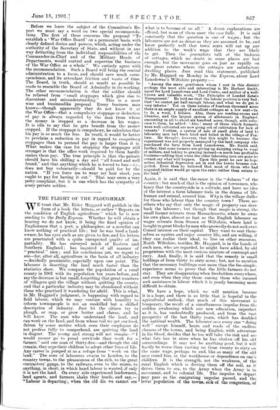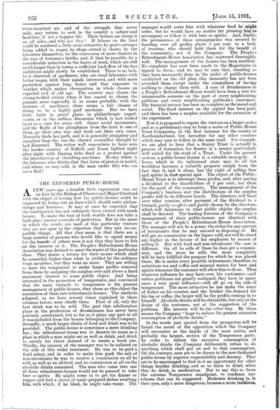THE FLIGHT OF THE PLOUGHMAN.
WE trust that Mr. Rider Haggard will publish in the form of a book the letters, or rather " Reports on the condition of English agriculture " which he is now sending to the Daily Express. Whether he will obtain a. bearing we do not know, it being the fixed opinion of Englishmen that a poet, a philosopher, or a novelist can know nothing of practical life ; but he was bred a land- owner, he has eyes such as are given to few, and his letters are penetrated with a quite unexpected quality of im- partiality. He has surveyed much of Eastern and Southern England ; has inquired of all manner of " practical " men ; and his conclusions are, we regret to see—for, after all, agriculture is the basis of all industry -decidedly pessimistic, especially upon one point. The labourer is deserting the laud much faster than the statistics show. We compare the population of a rural county in 1901 with its population ten years before, and say the decrease is but small, forgetting that great numbers of villagers quit the village without quitting the county, and that a particular industry may be abandoned without those who practised it wandering far afield. This is what, in Mr. Haggard's judgment, is happeninG with regard to field labour, which we may venture with humility to inform townspeople is not an unskilled. but a skilled description of industry. Just let the citizen try to plough, or reap, or grow butter and cheese, and lie will know. The men who understand the land, and Can work on the land, and from whose toil we get our food, driven by some motive which even their employers do not profess fully to comprehend, are quitting the land in disgust. The young and strong will not remain—" I would sooner go to penal servitude than work for a farmer," said one man of thirty-five—and though the old remain, they urge their children to adopt other lines of life. j Any career is jumped at as a refuge from " work on the land." The sons of labourers swarm to London, to the Country towns, to the pleasaunces of the rich, to the great contractors' gangs, to the railways, even to the mines, to anything, in short, in which hand labour is wanted, if only it is not the land. On every side experienced landowners, land agents, and farmers shake their heads, and say,— 'Labour is departing ; when the old die we cannot see what is to become of us all." A dozen explanations are offered, but none of them meet the case fully. It is said constantly that the question is one of wages ; but the labourers are not as dense as they are assumed to be, and know perfectly well that town rents will eat up any addition to the week's wage that they are likely to get. Then the journalists talk of the badness of cottages, which no doubt in some places are bad enough ; e.but the movement goes on just as rapidly on the great estates where the cottages are satisfactory dwelling places. Just read this statement, published by Mr. Haggard on Monday in the Express, about Lord Lansdowne's Wiltshire property :- "Among the many gentlemen whom I met in this district. perhaps the most able and interesting is Mr. Herbert Smith, agent for Lord Lansdowne and Lord Crewe, and author of a well- known and valuable work, The Principles of Landed Estate Management.' He told me that the labour position is very bad ; that ' we cannot get half enough labour, and what we do get is very inferior.' Yet on these estates of fourteen thousand acres there is an ample supply of excellent cottages at a low rent —ls. to 2s. a week, I believe. Also, there are reading-rooms and libraries, and the largest system of allotments in England, amounting in all to about six hundred acres, though, with refer- ence to them, he added : Alas ! many of these which formerly were well cultivated are now going out of cultivation for lack of tenants.' Further, a system of sale of small plots of land to labouring men hat been tried and failed in the village of Fox. ham. He thought, however, that this might he because the experiment was not properly managed by the land company who purchased the farm from Lord Lansdowne. Mr. Smith said, further, that some farmers are giving up dairying owing to want of milkers, and taking to grazing instead—a much less profitable business—adding that when the older labouring men are gone he cannot say what will happen. Upon this point he saw no hope unless industrial depression set in and the towns became con- gested. Even then be believed that most of those who had migrated thither would go upon the rates rather than return to the land."
Again, it is said that the cause is the " dulness " of the country ; but much of that is the opinion of townsmen, who fancy that the countryside is a solitude, and have no idea of the interest a farm labourer feels in the drama of life. human and animal, around him. Why is the village duller for those who labour than the country town? There are others who say that only the magic of property can draw back the labourer; but though that magic is strong, the small farmer retreats from Massachusetts, where he owns his own place, almost as fast as the English labourer on wages retreats from Sussex or Wiltshire, where land is bought in great blocks by men who avowedly do not seek even Consol interest on their capital. They want to seat them- selves as squires and enjoy country life, and are willing, if they can realise their ideal, to live on other resources. North Wiltshire, testifies Mr. Haggard, is in the hands of such men, who are regarded, he might have added, by old proprietors with the most anions mixture of contempt and envy. And, finally, it is said that the remedy is small holdings of from thirty to sixty acres ; but, not to mention that the necessary buildings cost more than the fee-simple. experience seems to prove that the little farmers do not stay. They are disappearing when freeholders everywhere, and even when they stay those among them who succeed seek assistance in labour which it is yearly becoming more difficult to obtain.
We have a hope, which we will mention because it is a hope, and there is so little that is hopeful in the agricultural outlook, that much of this movement is temporary, the result of a simultaneous impulse from the sudden awakening which our new education, imperfect as it is, has undoubtedly produced, and from the vast• prosperity of the last thirty years, which has doubled the national wealth. The labourer sees every one " doing well " except himself, hears and reads of the endless chances of the towns, and being English, with adventure in his blood, decides that he too will take the risk and see what fate has in store when he has shaken off his old surroundings. It, may not be anything good, but it will hardly be worse than rusting on from twenty to sixty on the same wage, perhaps to end, like so many of the old men round him, in the workhouse or dependence on ones children. It is the strength, not the weakness, of the rural English which is driving them off the soil, as it drives them to sea, to the Army when the Army is in movement, and to colonial life. The impulse to depart may pass as the emigrating impulse passed, and the lower population of the towns, sick of the congestion, of twice-breathed air, and of the struggle that never ends, may return, to seek in the country a • calmer and healthier, if not a happier life. Their betters are doing it on all sides, and why not they ? If labour on the land could be rendered a little more attractive by gratis cottages being added to wages, by shops owned in shares by the labourers themselves, by the concession of more chances in the way of foremen's berths, and, if that be possible, by a considerable reduction in the hours of work, which are still much longer than in towns, a sufficient back-flow of the less ambitious might slowly be established. There is no lack, be. it observed, of gardeners, who are rural labourers with better wages, with their minds interested, and with more protection against long hours and that exposure to weather which makes rheumatism in whole classes an expected evil of old age. The country may charm the strong-bodied citizen when it has ceased to charm the peasant, more especially if, as seems probable, with the increase of machinery .there seems a fair chance of rising to be a highly paid mechanic. But we have little faith in grand plans, in philanthropic experi- ments, or in the endless discussion which is now looked upon as a cure for every evil. Great social movements, and the flight of the ploughman from the land is one of them, go their own way and work out their own cures. Necessity finds her path, and it is generally straighter and smoother than the one the shrewd counsellor thought he had discerned. The writer well remembers to have seen the border country of Suffolk and Essex lighted night after night with blazing ricks fired as a protest against the introduction of threshing-machines. To-day where is the labourer who thinks that that form of protest is useful, and where, we may add, is the man under fifty who can use a flail











































 Previous page
Previous page